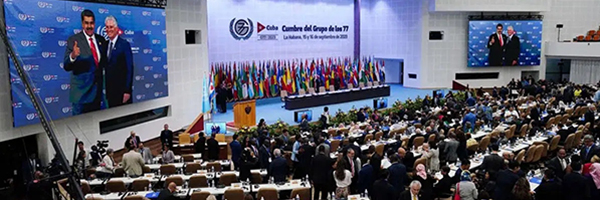G77+China Summit in Cuba Calls on Global South to ‘Change the Rules of the Game’
 Orinoco Tribune, September 17, 2023 —
Orinoco Tribune, September 17, 2023 —
Representatives of the global south raised their voices in Havana, Cuba, during the second day of the G77+China Summit, that concluded this Saturday with the adoption of the final declaration.
For the first time, Cuba welcomed 114 member countries to the forum, which were represented by their presidents, prime ministers and foreign ministers, in addition to high ranking officials from different international organizations.
During the first day of the meeting this Friday, September 15, 49 speakers called for unity, solidarity and cooperation between G77 members and China.
On the last day, interventions continued, including that of the head of state of Brazil, Luiz Inácio Lula Da Silva, who arrived in Havana just a few hours earlier. At the same time, a parallel program that was carried out by the guests of the Summit continued at the Convention Palace in the Cuban capital.
The adoption of the final declaration was another highlight from Saturday’s activities, which documents the group’s purposes and principles that address the needs of developing countries. According to Cuban Foreign Minister Bruno Rodríguez, the text is progressive, universal in scope, and positive and constructive in tone.
The G77+China summit’s final declaration demands an end to be put to “technological monopolies” and instead promotes technology transfer to achieve a “scientific and technological development that benefits all.” The final declaration consists of 46 articles.
Some of the key points drafted in the final declaration, according to Reuters and other mainstream media are:
- “We note and are deeply concerned by the existing disparities between developed and developing countries, in terms of conditions, possibilities and capacities to produce new scientific and technological knowledge.”
- “We call upon the international community, the United Nations System and the International Financial Institutions to support the efforts of the countries of the south to develop and strengthen their national science, technology and innovation systems.”
- “States that have monopoly and dominance in the field of information and communication technologies, including the internet, should not use these advances as tools of containment and suppression of the legitimate economic and technological development of other states.
- “We note the urgent need for a comprehensive reform of the international financial architecture with greater emphasis on cooperation and a greater decision-making role for developing countries.”
- “We reject the laws and regulations of extraterritorial impact and coercive economic measures.”
At the same time, the host foreign minister, Bruno Rodríguez, emphasized his loyalty to the purposes and principles of the group, which are attentive to the needs of developing countries and firmly attached to their demand for the right to development in the midst of an increasingly exclusive, inequitable, unjust and plundering international order.
The current challenges of developing science, technology, innovation, and the role of this regional mechanism in the geopolitical scenario is what guided the delegations’ presentations, especially with regards to their commitment to work together towards greater equity and cooperation.
Cuban President Miguel Díaz-Canel said the day before in his welcoming speech: “It is up to the south to change the rules of the game,” emphasizing that this is their right because the G77 members are the main victims of the current multidimensional global crisis.
In another part of his speech, Díaz-Canel called on the nations of this bloc to create consensus and coordination strategies to fight against the prevailing imperial forms of domination in the world.
The inauguration of the meeting was attended by the leader of the Cuban Revolution, Raúl Castro, and Secretary General of the United Nations António Guterres, who consideres that the G77 and China must raise their voices for a planet that works for all, with a view of building a system that defends human rights and looks after common interests.
In several presentations, Cuba’s name resounded with a unanimous condemnation of the economic, commercial and financial blockade imposed by the United States on the island for more than 60 years, and they also emphasized its example in scientific development in the midst of this blockade.
Argentinian President Alberto Fernández described the blockade as shameful and denounced Washington for having influenced the world during all this time to punish Cuba, also saying: “However, medicine, science and vaccines against COVID-19 were developed here, in absolute solitude and with a lot of effort.”
Venezuelan President Nicolás Maduro called for the lifting of this criminal siege against Cuba, and he stressed: “In the last six years my country, Venezuela, has been the victim of more than 950 unilateral coercive measures in all areas of the economy and society.”
African, Latin American and Asian dignitaries reaffirmed their solidarity with Cuba and thanked the island for their offered support and collaboration, despite the difficulties caused by this unilateral measure imposed by Washington.
In an atmosphere full of unity, with the premise of walking together and building collaborative networks from (and for) the global south, the meeting of the G77+China was an extraordinary meeting before the III South Summit, scheduled for next year in Kampala, Uganda.
